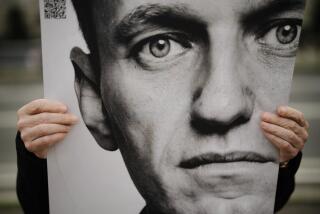A tall, elusive Russian and a cup of poison tea
- Share via
LONDON — Yuri Felshtinsky well remembers when he spent the better part of five hours pleading for the life of his friend Alexander Litvinenko.
It was May 22, 2000. Litvinenko, a colonel in the Russian Federal Security Service, or FSB, had just spent four months in prison, having gone public with allegations that senior secret police officers were involved in killings and kidnappings for financial gain.
Now he was free, but for how long? Felshtinsky called up Litvinenko’s former boss, Maj. Gen. Yevgeny Khokholkov, and agreed to meet him for dinner at a small restaurant near Moscow’s old Ukraina Hotel.
Khokholkov owned the restaurant and ordered it closed for the night so the two men could talk privately. “We were sitting there for five hours, from 7:30 to 12:30, discussing the fate of Litvinenko. It was a nice, professional conversation. I think it was a very honest talk,” Felshtinsky recalled in a recent interview.
“But the general explained to me there was no way, just no way, Litvinenko’s going to be pardoned.... He went against the system. He committed treason. And he was going to be punished for this.”
“At one point, he said, ‘If I ever see him in my doorway, I will kill him with my own hands.’ And he put his two hands together as if he was smashing the neck, as if it was a piece of pipe, or a baguette. And then he just said, ‘I’m joking, of course.’ But it was clear he was not joking. They hated him so much.”
Six and a half years later, Litvinenko died, felled by a dose of radioactive polonium-210 that investigators believe was delivered in a cup of tea at a London hotel bar. British police have spent months investigating the apparent homicide, in which 119 other people were at least slightly contaminated by polonium, including 15 who face long-term health risks, officials said.
As London prosecutors consider whether to file criminal charges, Felshtinsky and others among Litvinenko’s expatriate Russian friends have pieced together their own picture of how the former agent died. The friends, who include the former London station chief for the KGB -- the spy agency that preceded the FSB -- detailed their theory of the case in recent interviews with the Los Angeles Times. British law enforcement officials confirmed some of their contentions.
Based on their conversations with Litvinenko as he lay dying, their own contacts in the world of former KGB agents, and their meetings as witnesses with police investigators, these Russians believe Litvinenko’s slaying was the one Felshtinsky had tried to avert years earlier -- a punishment for betrayal from an organization that forgets nothing.
They believe that the true killer may have been a tall, elusive Russian man known only as Vladislav who shows up on airport surveillance videos and was briefly present during Litvinenko’s fatal lunch, then disappeared without a trace. Most likely, they say, he was a highly trained Russian spy operating in Europe.
“I’m absolutely sure this was a formal decision of the FSB,” Felshtinsky said. “Litvinenko was a target. The death trap was there. The sentence was there. It’s just, politically, they probably could not allow themselves to kill him until now.”
London police appear less ready to settle on a motive. “It’s still a complex picture,” said a British security official. Investigators have “put together a good forensic picture, but not much on the motive.”
The official confirmed that investigators were looking at the mysterious Vladislav, though he was cautious about the Russians’ description of him as a top intelligence operative. The official also said the British investigation had focused on two Russian businessmen who Litvinenko’s friends believe were at least collaborators in the case: Andrei Lugovoy and Dmitry Kovtun. Both men, former FSB agents, sat with Litvinenko in the Millennium Hotel’s Pine Bar as he drank the apparently deadly cup of tea.
Lugovoy and Kovtun have confirmed they met with Litvinenko, but say it was purely a business meeting. Both are back in Russia and have suffered from apparent radiation sickness. They say they would never have knowingly exposed themselves to polonium, which was found not only in the hotel bar, but in a hotel room believed to have been occupied by Lugovoy.
Authorities and former officials of the secret services in Russia also have strenuously denied any involvement in the case. They point out the illogic of using so exotic a poison and targeting a dissident who had largely faded from public view.
The apparent involvement of Lugovoy and Kovtun poses puzzles for police. If they were the killers, why did they not disappear after Litvinenko’s death? Instead, they presented themselves to the British Embassy in Moscow for questioning and gave a news conference.
Did the killer or killers know they were handling polonium, a highly lethal substance that leaves abundant radioactive traces? Polonium’s sloppy international trail points to a scenario in which masterminds could have given Lugovoy and Kovtun the mission of killing Litvinenko and provided them with poison, but not told them what the poison consisted of, the British security official said.
“Were they set up?” the official asked. “Their behavior suggests a remarkable lack of knowledge of polonium.”
Oleg Gordievsky, the former KGB station chief who defected to Britain in 1985 and later became friends with Litvinenko, said he was convinced Lugovoy and Kovtun were part of the plot but were not the ones who administered the poison.
That, he said, was probably the job of the tall, mysterious man who appears on airport surveillance videos. The cameras caught him talking with Kovtun as the two men arrived at Heathrow Airport on a flight from Hamburg, Germany, in the days before Litvinenko was poisoned.
According to Gordievsky, Litvinenko said before he died that he had seen the same man briefly in the hotel bar during his meeting to discuss business prospects with Lugovoy and Kovtun.
“Litvinenko remembered him in the hotel -- that he appeared quite briefly,” Gordievsky said. “Lugovoy said, ‘Oh, Vladislav.’ He said, ‘He’s one of our friends, Vladislav. He’s in the protection business; he also may be useful in finding a job for you.’ And then that guy disappeared. It’s my theory that he put [the poison] in the tea.”
British investigators were able to get the man’s passport details -- he was reportedly traveling on a European passport -- but were unable to trace him to any hotel, or to any flight leaving the country.
Gordievsky said he believed there was a dress rehearsal of the poisoning two weeks before the real thing. Lugovoy and Kovtun apparently met Litvinenko on Oct. 16 at the Piccadilly Circus sushi restaurant, where traces of polonium have also been found.
He believes the man known as Vladislav observed the meeting -- though he apparently did not appear on surveillance cameras -- and determined that the time or location was not right.
“They knew it was Litvinenko’s favorite place. They had lunch with him, and the polonium was ready, but they didn’t do anything because the conditions were not favorable,” Gordievsky said.
Litvinenko’s friends say they are convinced the FSB organized the killing, and they blame Russian President Vladimir V. Putin for creating a climate in which the security services feel free to kill a man in London.
Others suggest that the killing may have tapped into the FSB’s ranks in a less formal way. Litvinenko’s former direct supervisor at the FSB, Alexander Gusak, said it was possible Litvinenko had been killed by one of several former FSB informants outed when Litvinenko moved to Britain.
“I know that Litvinenko is a traitor. He betrayed the names of our agents to the British intelligence. I am talking about our agents in various organized crime gangs across Russia,” Gusak said in an interview.
“In 2001, some time after Litvinenko had defected to the West, one of our agents came to me and said that the Brits got in touch with him and wanted to talk with him.
“He was furious. He said that he is in grave danger now that his cover was exposed. I told him that I had suffered a lot from Litvinenko’s activities myself and told him about my huge problems. The man then said: ‘How can you stand all that? Do you want me to go to London and get his head for you?’
“Well, that was said at the heat of the moment, and the man didn’t mean literally to go to London to get Litvinenko’s head. But my point is that I know that at least one exposed agent has this huge grudge against Litvinenko. But there were many others whom Litvinenko betrayed and who may have the same motive.”
Murphy reported from London and Tehran and Rotella from London. Times staff writer Sergei L. Loiko in Moscow contributed to this report.
More to Read
Sign up for Essential California
The most important California stories and recommendations in your inbox every morning.
You may occasionally receive promotional content from the Los Angeles Times.













